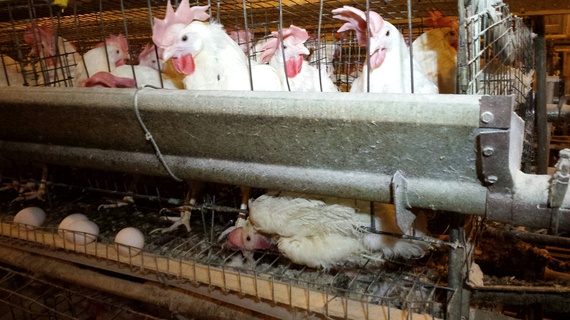An undercover investigation by the HSUS has revealed cruel treatment of egg-laying hens at New England's largest egg producer. The factory farm in question supplies eggs to several states, including Massachusetts, where volunteers are just finishing gathering signatures to place a measure on November's ballot. The measure would establish a common sense retail standard for the sale of eggs and other animal products, disallowing the sale within Massachusetts of products resulting from extreme methods of farm animal confinement.
The Maine facility where we conducted the investigation is a massive complex of almost 70 warehouses that together confine some four million laying hens. It's operated by Hillandale Farms and owned by egg magnate Jack DeCoster, whose filthy facilities in Iowa led to a 2010 salmonella outbreak for which he was criminally convicted. DeCoster is closely connected in business matters to Orland Bethel, the top guy at Hillandale, which now leases and operates the egg barns in the town of Turner, while DeCoster remains the owner of the facility. DeCoster and Bethel were at the heart of the 2010 egg recalls in Iowa and Ohio - a public-health crisis I wrote about in The Humane Economy. The Centers for Disease Control and Prevention estimates that the outbreak sickened tens of thousands of consumers in multiple states. More than half a billion eggs were recalled due to salmonella at the operations run by these men, and DeCoster was sentenced to federal prison for his role in the outbreak.
As you can see in this video, our investigator documented a veritable house of horrors, including:
- Hens confined in cages packed so tightly, they can't even spread their wings.
- Hens forced to share their cages with the rotting carcasses of dead cage-mates. Some dead birds are mummified and stuck to the wire cage floor. A worker told the HSUS investigator that when the birds are mummified like that, it means they've been in the cage (with living hens) "for months."
- Hens trapped by their necks, wings, and feet in the rusty wire cages.
- Hens found with bloody prolapses and horrendous facial abnormalities. The HSUS investigator was told by his supervisor not to do anything for one such hen. "As long as it's standing up and laying eggs, that's all that matters."
- Poisoned rodents found in hens' cages and combined with chicken manure to be sold for fertilizer.
That process starts with a vivid reminder about what life is like in these battery cages and on these factory farms. That should provide all the motivation we need to close this ugly era of animal agriculture and start anew.
This article first appeared on Wayne Pacelle's blog, A Humane Nation.

